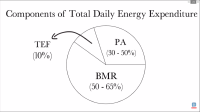Calories
Last updated: Apr 22, 2020
IMAGE GALLERY (1)
The calorie is a unit of energy.
Calorie
Amount of energy it would take to raise the temperature of 1 kg of water by
one degree Celcius.
Everything we consume has a calorie count, a measure of how much energy the
item stores in its chemical bonds.
Because energy is defined via work, the SI unit for energy is the same as the unit of work – the joule (J), named in honor of James Prescott Joule and his experiments on the mechanical equivalent of heat. In slightly more fundamental terms, 1 joule is equal to 1 newton metre and, in terms of SI base units.
Types of calories
- Calories (with capital C) - nutritional calories
calories (with small c)
1 Calorie = 1,000 calories = 4,184 Joules 1 Pound = 3,500 Calories
Calories IN/OUT effect Calories IN == Calories out remain same Calories IN > Calories out gain weight Calories IN < Calories out loose weight
2000 for women and 2500 for men. Based on factorrs like
- Average weight
- Physical activity
- Muscle mass
TDEE Total Daily Energy Expenditure
- BMR Basal Metabolic Rate Calories your body needs just to keep you alive.
- TEF Thermal Effect Of Food
- PA Physical Activity
TDEE = BMR + TEF + PAHow do we calculate BMR?
Mifflin-St Jeor Equation
BMR = (10 * Weight[Kg]) + (6.25 * height[cms]) + (5 * age[years]) + S S = 5 for men S = -161 for women

There is not perfect diet for human. As metabolism depends on gut bacteria in our intestines.
Use a glucose measuring device
Apps to measure calorie intake
- myFitnessPal
- Lose it *

